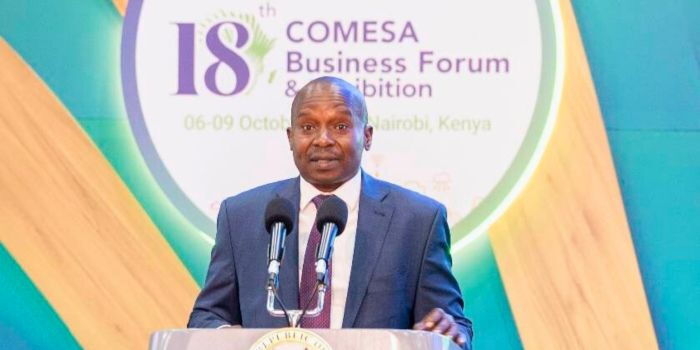As Kenya hosts the 24th Common Market for Eastern and Southern Africa (COMESA) Summit, the country is strategically positioning itself to gain major trade and investment advantages from the high-level gathering.
The government is looking to unlock new regional market opportunities, enhance digital trade systems, and strengthen its export base across Africa—particularly as President William Ruto takes over the rotating chairmanship of COMESA from Burundi this week.
The summit, held in Nairobi, has drawn heads of state, trade and agriculture ministers, top business leaders, and diplomats from all 21 COMESA member states.
This year’s theme, “Leveraging Digitalisation to Deepen Value Chains for Sustainable and Inclusive Growth,” reflects the region’s shared commitment to use technology to transform trade, manufacturing, and economic cooperation.
From Kenya’s standpoint, the government’s key priorities at the summit include pushing for harmonised trade regulations, eliminating non-tariff barriers (NTBs) that slow down regional trade, and accelerating the digital transformation of customs systems and border procedures.
The ultimate goal is to boost intra-COMESA exports, increase local value addition, and make it easier for Kenyan producers to access new markets across Africa.
Kenya’s Priorities at the Summit
During the COMESA–EU Horticulture Connect Forum, Agriculture and Livestock Development Cabinet Secretary Mutahi Kagwe underscored Kenya’s ongoing investment in digital systems that allow agricultural exports—especially horticulture—to be traced electronically from farm to market.
He noted that Kenya is working to secure preferential market access for its horticultural products, such as flowers, fruits, and vegetables, within the COMESA bloc and the wider European market.
Kagwe further urged member states to harmonise pesticide and quality standards, explaining that differences in regulations have limited the region’s competitiveness in global markets.
By standardising regulations, he argued, COMESA countries can build stronger agricultural value chains and attract more investors into agro-processing and export trade.
Boosting Economic Unity and Growth
Trade Cabinet Secretary Lee Kinyanjui, who is co-chairing the summit alongside COMESA Secretariat officials, described the gathering as a major opportunity to strengthen Africa’s economic unity and unlock the full potential of regional trade.
Speaking during the opening ceremony, Kinyanjui highlighted horticulture as a key driver of inclusive growth. “Horticulture is not just about flowers, fruits, and vegetables,” he said.
“It represents millions of jobs, empowers women and youth, earns valuable foreign exchange, and opens doors to new export markets for our economies.”
He also cautioned that unless COMESA countries eliminate non-tariff trade barriers, align product standards, and improve infrastructure, the region’s internal market will remain largely underutilised, limiting trade growth and industrialisation.
Kenya’s Trade Goals
Kenya’s trade agenda at the summit focuses on securing freer regional market access for Kenyan goods and services by pushing for the harmonisation of regulations and product certification across COMESA countries.
The government also wants to expand the use of digital trade tools, including electronic certificates of origin, customs interoperability, and paperless border systems to simplify and speed up cross-border trade.
Another key priority is promoting regional value chain development. Kenya wants COMESA countries to move away from exporting raw materials and instead invest in value-added processing—such as food processing, textile manufacturing, and agribusiness—to increase export earnings and create sustainable employment across member states.
Expected Benefits and Challenges
According to the Treasury and Trade Ministries, the expected outcomes of the summit for Kenya include increased export volumes, growth for small and medium-sized enterprises (SMEs), job creation in sectors like manufacturing and agriculture, and higher inflows of foreign direct investment (FDI).
Strengthening Kenya’s trade position within COMESA is also expected to boost its bargaining power in wider continental frameworks like the African Continental Free Trade Area (AfCFTA).
However, despite these opportunities, the region still faces significant hurdles. Persistent non-tariff barriers, poor transport and logistics infrastructure, high trade costs, and regulatory differences between member countries continue to slow down trade integration.
Implementing unified trade policies and agreements across all 21 COMESA states remains a complex and lengthy process.
Nevertheless, Kenya is confident that through stronger cooperation, digital transformation, and shared political will, the COMESA Summit can mark a turning point for regional trade—positioning Kenya and its neighbours for sustainable, inclusive, and digitally driven economic growth in the years ahead.
Join Government Official WhatsApp Channel To Stay Updated On time
https://whatsapp.com/channel/0029VaWT5gSGufImU8R0DO30


